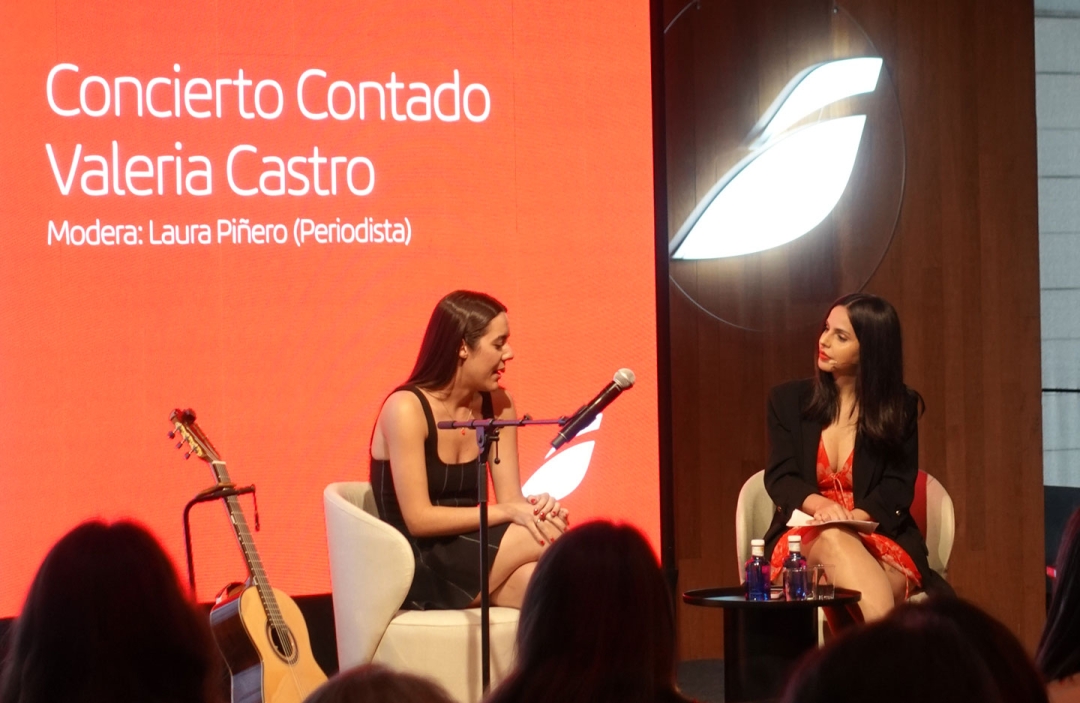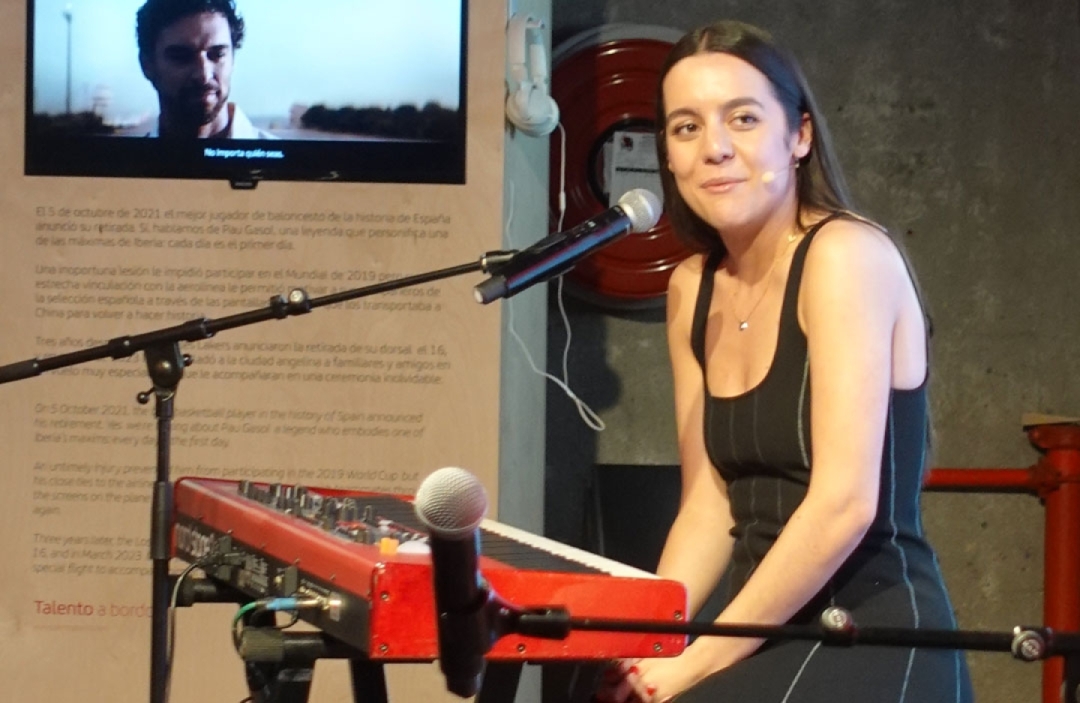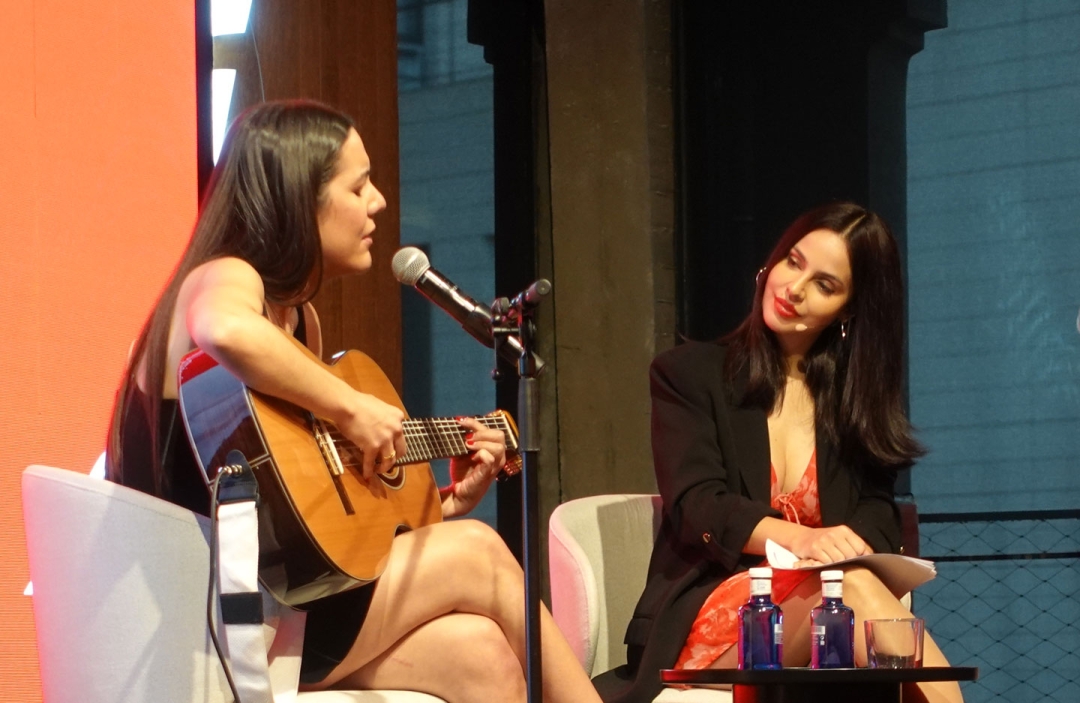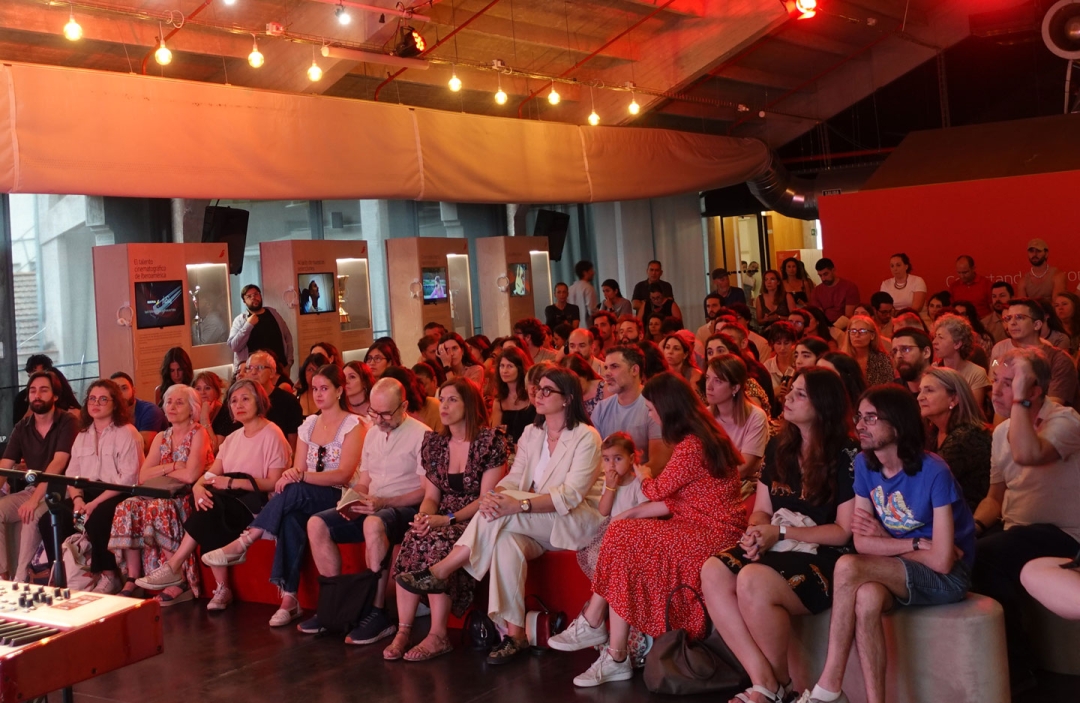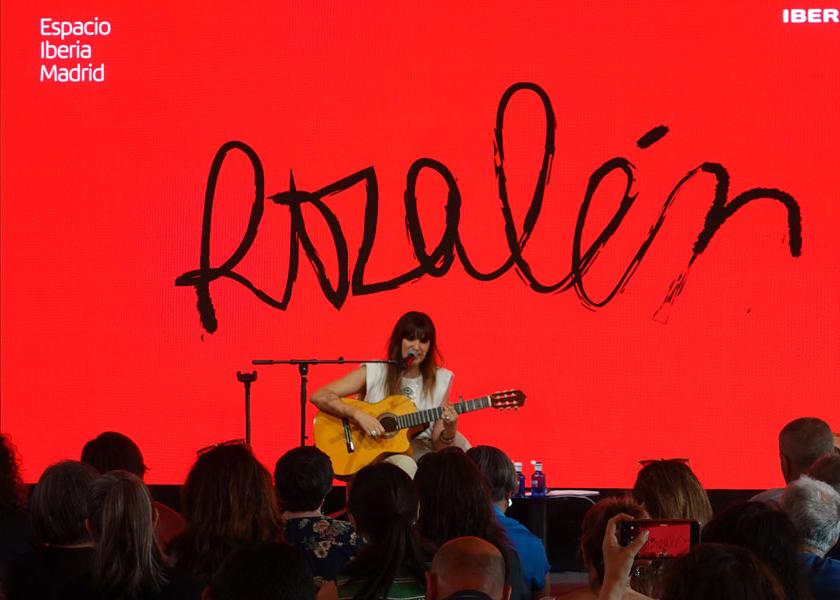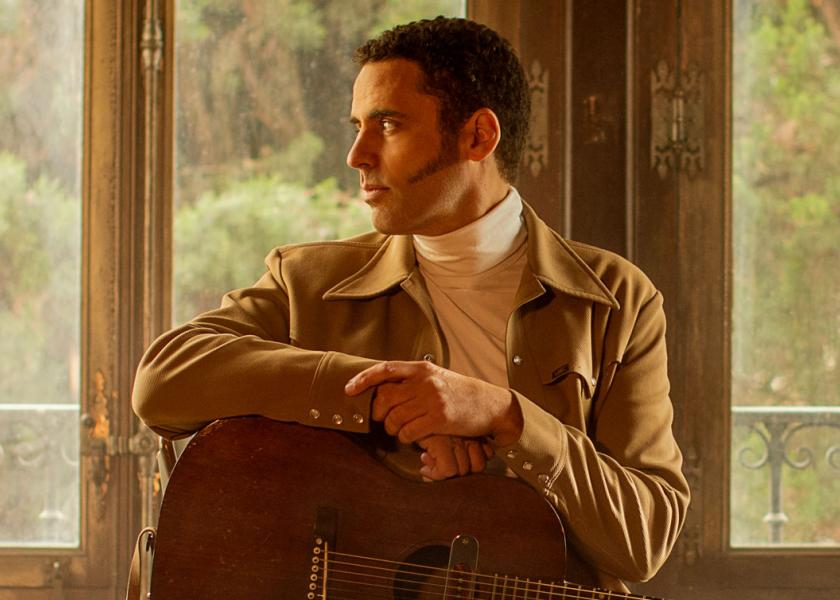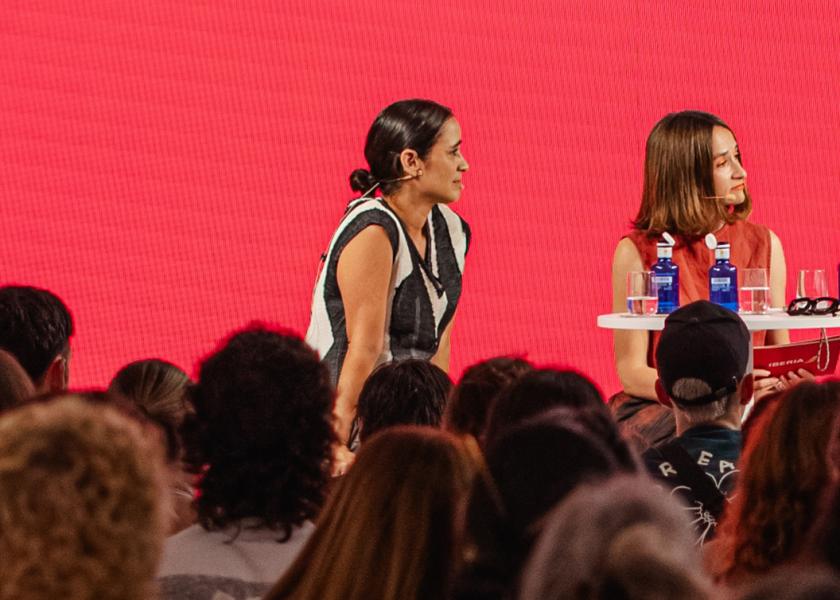Valeria Castro
Praising her roots
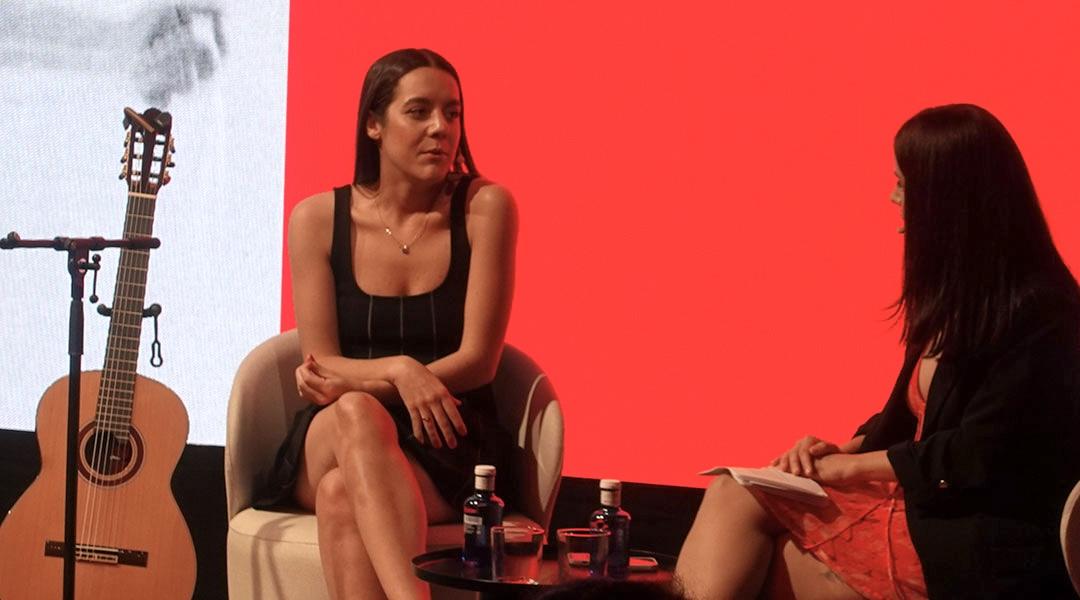
Valeria Castro is following in the footsteps of great Spanish singer-songwriters. One of those unique voices who, calling on her roots —her family, her homeland, her feelings— is able to touch the hearts of thousands of people. “Success is not a word that defines you,” humbly declares this young 26-year-old, who has just won three awards from the Academia de la Música.
The voice of Valeria Castro (Los Llanos de Aridane, 1999) is embracing and comforting, like a warm hug. That’s how dozens of people who attended the Spoken concert that this artist from the Canary Islands held at Espacio Iberia felt. During her chat with journalist Laura Piñero, stories were woven together with songs to create a comfortable environment, a stark contrast with the storm brewing outside. “I have to make a confession,” Valeria warned the audience and started looking back. At the tender age of four, she joined the Escuela Insular de Música de La Palma, a music school where she acquired her passion for music, but as she reminded us herself, “making music doesn’t only happen through formal education.” In fact, it was at home where she discovered her first role models: “There were no musicians at home, but there was a lot of love for music, and I also developed it from an early age. My uncle used to listen to Paco Ibáñez; he shared him with my father, who in turn shared him with me. My music is not protest songs, but it is inspired by them. Songs have a purpose, which is to express and defend what matters to you.”
Thanks to some of those role models, Valeria rose to fame. We’re referring to the covers she started to upload to social media and that caught the attention of a growing number of followers. Agua, the song by Jarabe de Palo written by the late Pau Donés, was one of her first covers that the public deeply connected to. “Admitting that you’re a newbie puts you in your musical place; it allows you to discover what moves you to then apply that to your own stories. Now I fly the flag of my own stories, but I’m eternally grateful to all those artists who inspired me.” And that’s how Valeria started her first song, a cover of Palabras para Julia by Paco Ibáñez, who adapted a poem by writer José Agustín Goytisolo.
“Admitting that you’re a newbie puts you in your musical place; it allows you to discover what moves you to then apply that to your own stories”
To tell her own stories, Valeria went to her roots: her family. “Being far away from home makes you connect with that need to go home. My means of self-defence has been to honour my family and keep them in mind. I am who I am thanks to them.” Among other things, thanks to the values she has received. Perhaps this is why the first song that made her feel proud was Hay amor, which touches on a particularly sensitive topic in her homeland: immigration. “My parents taught me that any human being is free to seek a better life.” Valeria defends tenderness in a world that seems to have forgotten its meaning, and it is present in her music: “A song written with affection may seem naïve, innocent, but it resonates in a different way. The things that matter to you are best defended through tenderness.” Valeria’s commitment is beyond doubt, and she does not deny it: “I’m not a political person, just a citizen who condemns unfairness when there’s a microphone in front of me. What makes me feel the proudest is when I manage to insert my opinions in small doses within my songs. It’s my way of making the world a kinder place.”
When Warner, her record label, gave her the chance, Valeria defended her own voice, and that’s how her first EP, Chiquita (2021), was born. “Nobody knew that I also wrote songs, and someone encouraged me to defend them,” she reminisces. They trusted her and songs like Guerrera, a homage to her mother and grandmother that can encompass all women, became a success. Valeria knows that, without the support of an audience that values her and listens to her, her musical dream wouldn’t have been possible, and who knows if she’d still be studying Biotechnology. “My mother and grandmother want me to finish my studies, but my musical career is going really well, and I need to make the most of it,” she laughs. So, plan B is almost in the graveyard because music has always been plan A. “I feel grateful for having a passion, and that ends up overshadowing anything else. I always knew I wanted to climb onstage and sing songs. When I told my parents I wanted to try my luck at music, I always felt their support and affection.”
“I feel grateful for having a passion, and that ends up overshadowing anything else. I always knew I wanted to climb onstage and sing songs”
Her geographical roots were the star of her first album, Con cariño y con cuidado (2023). Her creative process coincided with the eruption of the Tajogaite Volcano in La Palma. “I've always been a passionate advocate of my homeland, and two songs on the album spoke directly of that tragedy: Un hogar, which I wrote in Madrid when I couldn’t fly home because of the clouds of ash over La Palma, and La raíz, which I wrote facing the volcano from my parents’ house. This is my wound, and I want to tell its story, I thought.” When Valeria sang the verses of La raíz, Espacio Iberia filled with emotion. She admits that capturing the attention of the media during that time made her feel guilty. But as her grandmother Micaela reminds us at the end of Un hogar: “La vida sigue. Con mucha tristeza, pero sigue.” [Life carries on. With sadness, but life carries on].
El cuerpo después de todo
In El cuerpo después de todo, her second album, Valeria turned her gaze inwards: “It’s a more visceral, mature and introspective album. Your mind goes through many stages, and music helps to translate all those thoughts passing through. It has helped me to recognise the hang-ups and insecurities I live with to deal with them. I feel like I’ve learnt.” And has it helped you to heal?, asks our event moderator. “Saying that everything is fixed would be a lie, but I have recognised the enemy that I have inside which has led me to be cruel to myself,” Valeria confessed bravely and sincerely. She wrote Tiene que ser más fácil, one of the hits on the album, in tears after breaking down during a yoga class.
“It’s a more visceral, mature and introspective album.” Your mind goes through many stages, and music helps to translate all those thoughts passing through”
Part of El cuerpo después de todo was recorded in Mexico City, creating an almost magical musical connection. “We wanted to know what the songs were asking for, so five musicians locked ourselves up with five songs for five days. We were like children opening presents and enjoyed the process immensely.” Valeria admits that she’s always on the lookout for new sounds, whether from far away, like Mexico, or close by, like Galicia. The Galician table percussion she learnt from Tanxugueiras’ Las Panaderas opens the album on Devota. “I like to pay attention to sounds from other places because if something moves you, you can use it, always with respect.” This is how, without instruments, only playing percussion on the body of her guitar, Valeria played this song at Espacio Iberia.
To end her talk, Valeria confessed how she experiences concerts: “My songwriting has always been a means of self-defence, and all my songs have a common thread: healing the wound. I’m working on separating the songwriter from the person, but it’s not easy. By working with vulnerable material, I give my life in concerts, but I’m lucky that my audience gives a lot of support in return.” The same audience that bid her farewell with a standing ovation after she sang her last song, La Soledad. Because we don’t know how much solitude loves Valeria, but we do know that it is less than her audience loves her.
